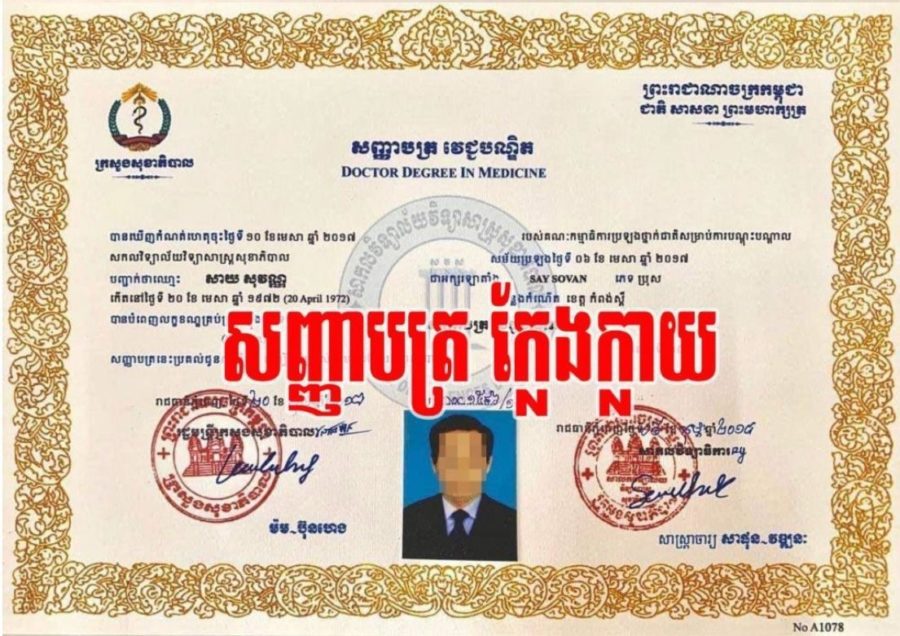Three men who were separately setting up home clinics in Kampong Speu province have apparently fled after they applied for medical licenses using fake diplomas in response to an inspection by provincial authorities.
The Medical Council of Cambodia said it rejected the applications of the three men, Say Sovan, Mok Sokchea and Kha Venghout, and was preparing a report for provincial authorities in order to commence legal action against them.
Or Vanthen, director of the Kampong Speu provincial health department, said the three individuals were in the process of opening treatment centers at their houses in Oral, Phnom Sruoch and Kon Pisey districts when health officers conducted their quarterly inspections. The officers found the businesses and told them to apply for a license, Vanthen said.
Kong Bunly, secretary-general of the council’s Kampong Speu secretariat, said that after filing their applications, the three men came in for interviews.
“We just asked them where did you study and such. But even just asking that, we realized immediately that they may never have gone to [medical] school because they didn’t know what subjects were taught in the first year, who their professors were, how many students graduated in their class. They knew nothing,” Bunly said.
Sovan may have taken medical vocational training during the Untac period, while Sokchea and Venghout possibly had some junior-level military medical training, he said.
The case went up to the council’s national level, which determined their University of Health Sciences diplomas were fake, Bunly said.
Since then, the three men could not be contacted, and Sovann was gone from his rented house, he said.
“They’re afraid. They fear trouble,” Bunly said. “They didn’t know it was so strict.”
Vanthen, from the provincial health department, said legal action would commence once the Medical Council sent its report.
“They should be sued in court for doing this,” he said. “We will continue investigating more to find where [the certificates] originally came from — who issued it?”
Health Ministry spokesperson Or Vandine declined to comment, while Kampong Speu provincial police chief Sam Samoun said he had not received the case yet.
Ouch Vuthy, president of the Virtue Medical Association, which was investigated in 2015 over allegedly unlicensed clinics, said fake documents plagued many sectors, not just health, and should be addressed.
“They use money to buy degrees, ranks and other things. It needs to be considered and ended, because the corruption is out there. It will cause serious problems in our society in the future if we don’t eliminate all of them,” Vuthy said.
In late 2014, nearly 300 villagers in Battambang province’s Roka commune were found to have contracted HIV after receiving treatment from an unlicensed doctor. In 2016, 16 mostly elderly villagers in Kandal province’s Peam village were also found to have contracted HIV from an unknown source.
Yong Kim Eng, president of the People Center for Development and Peace, said the latest cases may only be the tip of the iceberg.
“This is dangerous to the public health of the people, and if in only Kampong Speu we found three cases, we need to question whether other provinces have the same situations happening too,” Kim Eng said.













